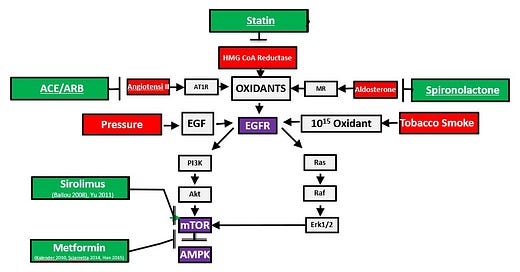The Rest of the Story: Other Medicines That Switch Off mTOR and Switch on AMPK
Lowering Risk Factors While Protecting Cells and Organs
The last two posts have provided a new understanding of the mechanism of action of metformin. It acts directly on the amino acid sensing mechanism that switches on mTOR and switches off AMPK. Four others medication types protect cells and organs by also switching off mTOR and switching on AMPK, but they do it through an entirely different mechanism.
Growth factors are also critical in fetal development. Growth factor signaling switches on mTOR and switches off AMPK. For example, the epidermal growth factor (EGF) is essential for normal placental development and fetal growth. The epidermal growth factor receptor (EGFR) is an even more interesting story and it is activated by EGF and several other growth factors. The EGFR (purple box in the center) is involved in skin, hair follicle, and bone formation in the fetus and child. Here is the crazy part. Oxidants cause a more persistent EGFR activation that is a critical mechanism in cardiovascular diseases and cancer in adults. This fact is very important. Any kind of smoke contains oxidants. A single puff of cigarette smoke contains ten to the fifteenth oxidative particles. That fact provides the link between smoking, cardiovascular disease, emphysema, and cancer.
As the diagram above shows, lisinopril, losartan, spironolactone, and eplerenone for high blood pressure and statins for cholesterol protect cells and organs by blocking oxidant production that activates EGFR which in turn switches on mTOR and switches off AMPK. Metformin and empagliflozin directly switch off mTOR and switch on AMPK. Lisinopril, losartan, spironolactone, and eplerenone do it indirectly to provide organ and cell protection beyond lowering the target risk factor. Medicines that switch off mTOR and switch on AMPK don’t merely lower the risk factor, they protect cells and organs to provide a longer healthier life.





How about marijuana, a few puffs a day for sleep aid? Just as bad as cigarettes?
Hey Bill, is this a misstatement? “ It acts directly on the amino acid sensing mechanism that switches on mTOR and switches off AMPK.” Or the opposite happens?